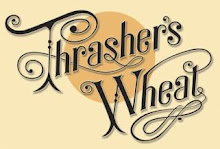Hey, Neil Young: We young singers are hog-tied, too
A very interesting open letter to Neil Young in the San Francisco Chronicle titled Hey, Neil Young: We young singers are hog-tied, too by Stephan Smith.
Dear Neil,
You recently said that you felt compelled to write your new album "Living With War" because you got tired of waiting for young protest singers to pick up the torch. I'm compelled to tell you that young protest singers are here, and we're holding the flame. I'm one of them.
The trouble is, you can't hear us on major radio stations for the same reasons you noted last year when you poignantly stated, "I can't do anything in the record industry, or especially radio, because it's so controlled by corporations."
While established artists like yourself may have felt your hands tied, the truth is far worse for upcoming artists: Even booking agents and managers won't touch us for fear that we will offend their audiences in a country where consumerism and patriotism stand united, as your song "Restless Consumer" makes clear.
Bono was right when, at U2's induction to the Rock and Roll Hall of Fame last year, he said, "There is very little chance for there to be another U2 the way the business is constructed right now." Describing corporate dependency on the toothless hit single, he said, "You have to have the hit single immediately. Bruce Springsteen didn't have a single for 10 years. Neil Young, I'm not sure, he ever had a single."
If radio won't play an artist whose singles touch on politics, the only hope is to get a break opening for established acts. But, I don't know of a single mainstream artist whose agent will allow an unestablished political artist to open for them. Would you?
Your good friend and former record company president Howie Klein, who wrote the first review of "Living With War," put it eloquently when he told me he thinks it's depressing that in a world of unprecedented global economic inequality, environmental degradation and increasing frustration causing terrorism, today's Bob Dylans and Neil Youngs are not getting a chance to be heard.
Some see positive developments, though. Industry legend and activist Danny Goldberg, now Vice Chairman of Air America, says, "The Internet provides opportunities for new artists to find a fan base that was not available in years past." But still, the Internet has its limits.
I should know. As then-president of Artemis Records, the nation's largest independent label, Danny signed me in 2003 after my song "The Bell," with Pete Seeger and Dean Ween, which was released on the internet on Sept. 11, 2002, burst into mainstream press as "the anti-war anthem for this generation."
But, even though "The Bell" was downloaded hundreds of thousands of times, printed over 250,000 times on various compilations, and was covered by artists from Dave Matthews to DJ Spooky, booking agents and managers remained too fearful to take it on. Why? Because most industry professionals, even those who pride themselves on their left leanings, believe they have to protect their audiences from politics.
As Geoff Edgers reported in the Boston Globe, when discussing the Dixie Chicks and Pink, whose songs "Not Ready to Make Nice" and "Dear Mr. President" address President Bush, John Hart, president of Bullseye Marketing Research in Nashville, said, "I don't think they're bad people. I just think they're expressing an opinion.
"Unfortunately, they think most of their listeners or fans feel that way, and they're wrong. All the fans want is to hear their music."
But this is not true. As Howie revealed to me, contrary to widespread belief of a detrimental backlash to the Dixie Chicks' anti-Bush comments, radio response to their new album was 90 percent positive. It was only 10 percent of the listeners who objected.
Already, during the initial invasion of Iraq, the industry knew there was a market for dissent. When I took part in the launch of ProtestRecords.com in March 2003, a Web site of free protest MP3s started by Sonic Youth's Thurston Moore, replete with unknown artists, the Web site was hit over 1 million times in the first six days. Still, the industry failed to respond while soldiers and civilians continued to die.
Many say that Green Day and Steve Earle received Grammys for their largely topical albums, and Kanye West, Bright Eyes and Anti-Flag have all profited from dissent in the past 2 years, but this is misleading: These are all artists who were established before they questioned the war in Iraq. For now, questioning authority in the mainstream industry remains reserved for celebrities.
When I called Seeger recently to tell him about your great new album and your thought-provoking comment, Pete said, "Protest singers have never been played on the radio. In the 1930s, at the depths of the Depression, no radio station played the songs of the miners organizing for their rights in West Virginia, like 'Which Side Are You On.' "
In the 1960s, artists like yourself, Dylan, Phil Ochs and Joan Baez could rise to the fore because visionaries like Pete and Woody Guthrie built a community independent of the industry, and shared it with the youth.
Neil, will you, or Springsteen with his "We Shall Overcome," follow in their footsteps?
Yours,
Stephan Smith
Stephan Smith is an Iraqi American songwriter who grew up in Appalachia. His newest single, "Another World Is Possible," will begin streaming exclusively at his Web site www.stephansmith.com today. His father's family lives under the daily threat of bombing in Baghdad and Mosul.
Neil, your move?


































 Concert Review of the Moment
Concert Review of the Moment







![[EFC Blue Ribbon - Free Speech Online]](http://www.thrasherswheat.org/gifs/free-speech.gif)











 Submit Your Neil Links Now!
Submit Your Neil Links Now!























 Four Dead in Ohio
Four Dead in Ohio














